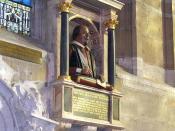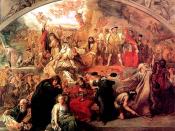This Sonnet is very interesting. It is a very confusing poem, as well. Shakespeare uses many poetic devices, such as alliteration, symbolism, metaphors, and many more. At first it seems that Shakespeare is talking about a beautiful girl. Look deeper and think deeper. He is actually talking about leaves, trees, or nature. Shakespeare is showing his love for in this poem.
In the first quatrain, Shakespeare is describing how nature will never look old to him. Since Shakespeare notice nature, he saw splendorous beauty. "For, as you were when first your eye I ey'd, â¦"(Shakespeare Line 2). In this line he uses assonance, "eye I ey'd". Even through the years it still looks beautiful to him. He means three years because he says "â¦Three winters coldâ¦." Even when the winter steals the summer's pride and splendor it will still be pretty. Shakespeare also uses personification. He says that winter has taken away the summer's beauty.
This line is the Volta of the poem. In this quatrain it seems that he is writing about a person but he is writing about nature and how it changes through the seasons.
The next quatrain talks about the progression of the seasons and about what affect it has on nature. Spring allows nature to grow with its rain. Summer gets so hot that it burns the grass. "Three April perfumes in three hot Junes Burn'd,â¦"(ShakespeareSonnet 104). Shakespeare writes how spring changes into fall and how the fragrances of rain in April turn into hot muggy air. The process or progression of the season's changes the look of nature but it will always return back to regular. Winter kills nature and spring returns it back to its true self. The change allows people to admire the beauty of nature during its life.
In the third quatrain Shakespeare says that the beauty will always remain. Beauty changes with time. "Ah, yet doth beauty, like a dial hand, Steal from his figure and no pace perceiv'd." (ShakespeareSonnet 104). This line says that beauty is like a watch hand; it always changes with time; that is a metaphor. Take time away and the progress cannot be comprehended. "â¦His figureâ¦" is referring to the dial's numeral figure. "So your sweet hue, which methinks still doth stand, Hath motion, and mine eye may be deceiv'd."(ShakespeareSonnet 104). Hue means appearance. Shakespeare says that its appearance will always be beautiful and timeless. In this line he is also saying that the changes may have deceived his eyes.
Shakespeare's couplets usually change the mood, but this couplet just reinforces the idea of the sonnet. "For fear of which, hear this; thou age unbred: Ere you were born was beauty's summer dead." (ShakespeareSonnet 104). "Ere" means before and "unberd" means unborn. This couplet supports the sonnet. It is saying that before it grew the beauty of summer is dead. Without nature to begin with, there is no beauty of summer. This couplet is very strong.
Shakespeare is a very powerful writer. He uses many devices to allow the reader to think and investigate his work. Shakespeare's work will always have people trying to decipher what he is saying. His writings will have people thinking for years to come.





